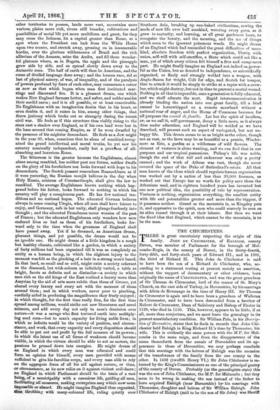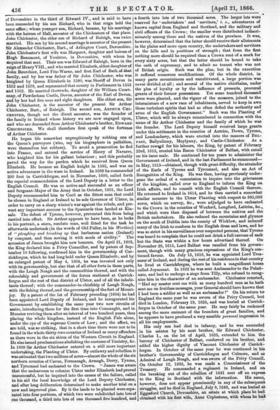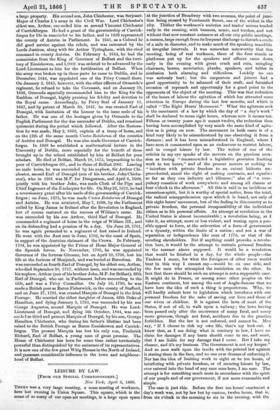THE CHICIIESTERS.
THERE• is great uncertainty respecting the origin of this family. JOHN DE CHICHESTER, of RALEIGH, county Devon, was member of. Parliament for the borough of Met- combe-Regis, in. the- county of Dorset, in the thirty-fourth, forty-fifth, and forty-sixth years of Edward Ili., and in' 1381', the third of Richard' It. This John de Chichester is said' to have been the son of a Richard de Chichester, who, ac- cording to a statement resting at present merely on assertion, without the support of documentary or other evidence, bore originally the name of CIRENCESTER, and was the great grandson of Sir Thomas de Cirencester, lord. of the manor of St. Mary's Church, on the east side of Torbay, in Devonshire, by his marriage with Alicia de Rotomago in the_ time of Henry III. Sir Thomas- de Cirencester is again said to have. been a grandson. of Waller= de Cirencester, said to. have been descended from a brother of Robert de Cirencester, Dean of and Bishop of Exeter in. 1128, who-died in 1150. This, however, appears to be little, if at all, more than conjecture, and we must leave the genealogy in its present unsatisfactory condition. Sir -William Pole, in his Descrip- tion of Devonshire, states that he fin& in records that John Chi: cheater held Raleigh in Wmg_Richard IL's time by Thomasine, his wife. This is evidently the same person with the M.P. for Mel' combo in the same reign, and from the disappearance of- the name thenceforth from the annals of Dbrsetsliire and.its ap- pearance in those of Devonshire, we may perhaps conclude that this marriage with the heiress of Raleigh was the occasion of the transference of the family from the one county to the other. In 1433- (twelfth Henry VI) Sir John Chichester is re- turned by the Wines Commissioners as one of the principal' gentry ofthe county of-Devon. Probably (as the genealbgists state) this was the son of'Jblin .Chichester, thellr. for Melamine ; But they seem to be wrcmg in making the son instead' of "the father to have .acquired. Weigh (hear Barnstable) by his marriage with Tliomasine, daughter and: heiress ot-Sir WiIIIam Raleigh. John :Chichester of Raleigh (Said to be the son of Sir John)' was Sheriff of Devonshire in the third of Edward IV., and is said to have been succeeded by his son Richard, who in that reign held the same office ; whose younger son, Richard, became, by his marriage with the heiress of Hall, ancestor of the Chichesters of that place. John Chichester, the elder son of Richard of Raleigh, was twice married. His son by his second marriage is ancestor of the present Sir Alexander Chichester, Bart., of Arlington Court, Devonshire. John Chichester's first wife was Margaret, daughter and heiress of Hugh Beaumont, of Youlston, in Devonshire, with whom he acquired that seat. Their son was Edward of Raleigh, born in the reign of Henry VIII., and who married Elizabeth, eldest daughter of John Bourchier, Lord Fitz-Warne, and first Earl of Bath nf -that family, and by her was father of Sir John Chichester, who was knighted by Queen Elizabeth in 1580, was Sheriff of Devon in 1552 and 1578, and represented that county in Parliament in 1553 and 1562. He married Gertrude, daughter of Sir William Court- enay, of Powderham Castle, Devon, ancestor of the Earl of Devon, and by her had five sons and eight daughters. His eldest son, Sir John Chichester, is the ancestor of the present Sir Arthur Chichester, Bart., of Raleigh. The second son, ARTHUR CHI- CHESTER, though not the direct ancestor, was the founder of the family in Ireland whose history we are now engaged upon, and who are descended from Arthur Chichester's brother, EDWARD CHICHESTER. We shall therefore first speak of the fortunes of Arthur Chichester.
He began life somewhat unpropitiously by robbing one of the Queen's purveyors (who, say his biographers in palliation, were themselves but robbers). To avoid a prosecution he fled into France, and entered the service of Henry of Navarre, who knighted him for his gallant behaviour ; and this probably paved the way for the pardon which he received from Queen Elizabeth. He became an English knight in 1595, and was an active adventurer in the wars in Ireland. In 1599 he commanded 200 foot in Carrickfergus, and in November, 1600, called forth the especial commendation of the Lord Deputy in a letter to the English Council. He was so active and successful as an officer and Sergeant-Major of the Army that in October, 1601, the Lord Deputy recommended him to Cecil as the fittest man that could be chosen in England or Ireland to be sole Governor of Ulster, in order to carry on a sharp winter's war against the rebels, and pre- vent any important succour to the Spaniards then landed at Kin- sale. The defeat of Tyrone, however, prevented this from being carried into effect. Sir Arthur appears to have been, as he looks in his portrait, a stern, resolute man, well fitted for the task he afterwards undertook (in the words of Old Fuller, in his Worthies) of " ploughing and breaking up that barbarous nation (Ireland) by conquest, and then sowing it with seeds of civility." The accession of James brought him new honours. On April 21, 1603, the King declared him a Privy Councillor, and by patent of Sep- tember 10 following, confirmed him in the governorship of Car- rickfergus, which he had long held under Queen Elizabeth; and by an enlarged patent of May 4, 1604, he was invested not only with its governorship, but also that of all other forts in those parts, with the Lough Neagh and the commodities thereof, and with the colonelship and government of the forces stationed at Carrick- fergus and the rest of that district of Ulster, and of all the inhabi- tants thereof; with the commander-in-chiefship of Lough Neagh, with the fishing thereof, and the governorship of the fort of Mount- joy. By a patent of the 1st of February preceding (1604) he had been appointed Lord Deputy of Ireland, and he inaugurated his Government by establishing the same year two new circuits of assize, introducing them for the first time into Connaught, and in Munster reviving them after an interval of two hundred years, thus placing the whole kingdom, instead of the English Pale alone, under the eye of the supreme Courts of Law ; and the effect, we are told, was so striking, that in a short time there were not to be found in the whole thirty-two counties of Ireland as many offenders as there were in the six shires of the Western Circuit in England. He also issued proclamations abolishing the customs of 'I'anistry, &c. In 1608 Sir Arthur Chichester entered on a still more important undertaking, the Planting of Ulster. By outlawry and rebellion it was estimated that two millions of acres—almost the whole of the six northern counties of Cavan, Fermanagh, Armagh, Derry, Tyrone, and Tyrconnel had escheated to the Crown. " James was aware that the endeavours to colonize Ulster under Elizabeth had proved unsuccessful, but he inquired into the causes of the failure, called to his aid the local knowledge of the Lord Deputy Chichester, and after long deliberation determined to make another trial on a new and improved plan. By it the lands to be planted were sepa- rated into four portions, of which two were subdivided into lots of one thousand, a third into lots of one thousand five hundred, and a fourth into lots of two thousand acres. The larger lots were reserved for ' undertakers' and servitors,' i. e., adventurers of known capital from England and Scotland, and the military and civil officers of the Crown ; the smaller were distributed indiscri- minately among these and the natives of the province. It was, however, determined that the latter should receive their allotments in the plains and more open country, the undertakers and servitors on the hills and in positions of strength ; that from the first nothing more should be required than a Crown rent of a mark for every sixty acres, but that the latter should be bound to take the oath of supremacy, and to admit no tenant who was not of British origin. Such was the plan, but in the execution it suffered numerous modifications. Of the whole district, in many parts mountainous and uncultivated, a large portion was never divided at all ; and several of the native chieftains, under the plea of loyalty or by the influence of presents, procured grants of their former possessions. Yet some hundred thousand acres were planted, and the vigour of the measure, joined to the intermixture of a new race of inhabitants, served to keep in awe. those turbulent spirits that had so often defied the authority and arms of the English Government." Such was the Planting or Ulster, which will be always remembered in connection with the name of Sir Arthur Chichester and the family of which he was the founder. The Lord Deputy himself received large grants under this settlement in the counties of Antrim, Down, Tyrone, and Londonderry, which were erected into the manors of BEL- FAST, Ballynlinny, Moylynny, and Castle-Chichester. As a. further reward for his labours, the King, by patent of February 23rd, 1613, created him Baron Chichester of Belfast, with entail on his issue male. He continued for ten years to administer the Government of Ireland, and in the last Parliament he summoned— in May, 1613—obtained, though with great difficulty, the attainder of the Earls of Tyrone and Tyrconnel, and also an Act of Recognition of the King. He was then, having previously under- gone the ordeal of a commission to inquire into the grievances. of the kingdom, called over to England to inform the King on. Irish affairs, and to consult with the English Council thereon.. He returned to Ireland in 1614, and he then carried a somewhat similar measure to the Ulster Planting with respect to 385,000 acres, which on survey, &c., were adjudged to have escheated to the Crown in the counties of Wexford, Longford, Leitrim, &c.,. and which were then disposed of between the natives and the British undertakers. He also reduced the mountains and glynnes on the south of Dublin into the county of Wicklow, and induced many of the Irish to conform to the English dress and laws, and he. was so strict in his surveillance over suspected persons, that Tyrone was heard to complain that he could not drink a full carouse of sack but the State was within a few hours advertised thereof. Om November 29, 1615, Lord Belfast was recalled from his govern- ment, though with many gracious expressions of the King's con- tinued favour. On July 13, 1616, he was appointed Lord Trea- surer of Ireland, and during the rest of his residence in that country- he lived at Carrickfergus, where he built a magnificent house called Joymount. In 1622 he was sent Ambassador to the Palati- nate, and had to undergo a siege from Tilly, who refused to recog- nize him in the character of an ambassador. Chichester retorted,. " Had my master sent me with as many hundred men as he hath sent me on fruitless messages, your General should have known that I had been a soldier as well as an ambassador!" On his return tea England the same year he was sworn of the Privy Council, buC died in London, February 19, 1625, and was buried at Carrick- fergus in October of the same year. He may fairly be reckoned among the more eminent of the founders of great families, and he appears to have produced a very sensible personal impression in. all his employments.
His only son had died in infancy, and he was succeeded in his estates by his next brother, Sir Edward Chichester. Charles I., on the 1st of April, 1625, extended to him the barony of Chichester of Belfast, conferred on his brother, and. added the higher dignity of Viscount Chichester of Carrick- fergus. In October of the same year he was continued in his brother's Governorship of Carrickfergus and Culmore, and as Admiral of Lough Neagh, and was sworn of the Privy Council. On October 12, 1632, he was made a Commissioner of the He commanded a regiment in Ireland, and on the breaking out of the rebellion of 1641 sent off an express. to the King in Scotland with the information. His name, however, does not appear prominently in any of the subsequent. struggles, and he died in England, July 8, 1648, and was buried at. Eggesford Church, Devonshire, an estate at which place he had obtained with his first wife, Anne Coplestone, with whom he had a large property. His second son, John Chichester, was Serjeant- Major of Charles I.'s army in the Civil War. Lord Chichester's eldest son, Arthur, succeeded him as second Viscount Chichester of Carrickfergus. He had a grant of the governorship of Carrick- fergus for life in remainder to his father, and in 1639 represented the county of Antrim in Parliament. In 1641, as a Colonel he did good service against the rebels, and was entrusted by the Lords Justices, along with Sir Arthur Tyringham, with the chief command in county Antrim. On February 4, 1644, he had the commission from the King of Governor of Belfast and the terri- tory of Ennishowen, and 1,000/. was ordered to be advanced by the Lord-Lieutenant to him for the fortification of Belfast. When the army was broken up in those parts he came to Dublin, and in December, 1644, was appointed one of the Privy Council there. On January 2, 1645, however, with the other officers of Ormonde's regiment, he refused to take the Covenant, and on January 19, 1646, Ormonde especially recommended him to the King for the Earldom of Donegal, highly praising his fidelity and devotion to the Royal cause. Accordingly, by Privy Seal of January 15, 1647, and by patent of March 30, 1647, he was created Earl of Donegal, with limitation of the honour to the issue male of his father. He was one of the hostages given by Ormonde to the English Parliament for the due surrender of Dublin, and remained quiescent during the period which followed. After the Restora- tion he was made, May 2, 1660, captain of a troop of horse, and on the 12th of the same month Custos Rotulorum of the counties of Antrim and Donegal. He was also made Governor of Carrick- fergus. In 1668 he established a mathematical lecture in the University of Dublin, more especially for the benefit of those brought up in the school established by him at Belfast for poor scholars. He died at Belfast, March 18, 1675, bequeathing to the poor of Carrickfergus 501., and to those of Belfast 2001. Leaving no male heirs, he was succeeded by his nephew, Sir Arthur Chi- chester, second Earl of Donegal (son of his brother, John Chiche- ster), who in 1661 was M.P. for Dungannon, and April 6, 1668, jointly with his brother John, was made Clerk of the Pipe and Chief Ingrosser of the Exchequer for life. On May22, 1672, he had a reversionary grant after his uncle of the governorship of Carrick- fergus ; on June, 1675, he was made Custos Rotulorum of Donegal and Antrim. He was attainted, May 7, 1689, by the Parliament called by King James in Ireland after the Revolution in England, but of course restored on the success of William's cause. He was succeeded by his son Arthur, third Earl of Donegal. He commanded a regiment of horse in the reign of William III., and on its disbanding had a pension of 8s. a day. On June 28, 1701, he was again promoted to a regiment of foot raised in Ireland. He went with the fleet sent in June, 1702, to the coast of Spain, in support of the Austrian claimant of the Crown. In February, 1704, he was appointed by the Prince of Hesse Major-General of the Spanish forces. In November, 1705, he was appointed Governor of the fortress Gironne, but on April 10, 1706, lost his life at the fortress of Monjuich, and was buried at Barcelona. He was succeeded as fourth Earl of Donegal, by his eldest son, Arthur, who died September 30, 1757, without issue, and was succeeded by his nephew, Arthur (son of his brother John, M.P. for Belfast), fifth Earl of Donegal, who sat in Parliament before succeeding to the title, and was a Privy Councillor. On July 16, 1790, he was
made a British peer as Baron Fisherwick, in the county of Stafford, and on June 27, 1791, was created Marquis of Donegal in the Irish Peerage. He married the eldest daughter of James, fifth Duke of Hamilton, and dying January 5, 1799, was succeeded by his son George Augustus, second Marquis of Donegal. He was Lord- Lieutenant of Donegal, and dying 5th October, 1844, was sue- ceeled as third and present Marquis of Donegal, by his son, George Hamilton Chichester, who during his father's lifetime had been raised to the British Peerage as Baron Ennishowen and Carrick- fergus. The present Marquis has lost his only son, Frederick Richard, Earl of Belfast, a young man of great promise. The House of Chichester has been for some time rather territorially powerful than distinguished by the eminence of its representatives. It is now one of the few great Whig Houses in the North of Ireland, and possesses considerable influence in the town and neighbour- hood of Belfast.
































 Previous page
Previous page